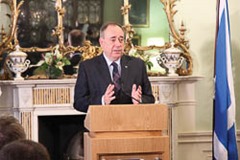Devolution in flux
 agendaNi considers the consequences for devolved government after the Scottish referendum.
agendaNi considers the consequences for devolved government after the Scottish referendum.
The shape of the UK was affirmed at 6.08am on 19 September as the Fife declaration edged the Scottish ‘no’ vote over the line. The poll generated a massive turnout (85 per cent) but delivered a low margin of victory for unionism (55 per cent). The union’s structure, though, will now undergo considerable change on the back of the referendum result and the political fall-out from the referendum will be much more significant than the actual vote.
The independence debate has created a momentum for devolving more power. The Scotland Act already allows for the devolution of stamp duty and landfill tax and the ability to vary 10p of income tax. The Westminster party leaders have pledged new powers – as yet undetermined – with a view to reaching an agreement with the Scottish Government by 30 November.
It is noteworthy that David Cameron’s initial response to the result was to demand a “decisive answer” to the question of “English votes for English laws”. If enacted, the proposal would give the Conservatives an obvious electoral advantage over Labour but it is far from straightforward as most Acts of Parliament apply to more than one UK nation.
‘Devo max’ – transferring everything except defence and foreign affairs – is similar to Quebec’s position and closest to the SNP’s stance. The Lib Dems clearly prefer a federal union.
Labour wants to devolve welfare but will be under pressure to go further and win back votes from a strengthened SNP. The Conservatives claim that ‘devo max’ would undermine the union but are prepared to fully devolve income tax.
The clear thrust in Scotland and Wales is to transfer more power from Westminster. The Welsh Government has already published its own blueprint for change, including a needs-based alternative to the Barnett formula prior to the further devolution of taxation. Welsh First Minister Carwyn Jones also wants to see a written constitution and an elected upper house for Parliament.
An end to Barnett will almost certainly reduce Northern Ireland’s allocation. The Executive has a responsibility to manage its budget efficiently and, in the present dispute, most of the savings demanded by the Treasury come from overspends rather than welfare reform.
Irish nationalists will press for more devolution as part of the general shift in power away from London. Beyond the corporation tax transfer, many unionists see the status quo as the most stable option, financially and constitutionally.
One of the major challenges in the new debate is to ensure that perspectives from all parts of the UK – whether unionist, nationalist or other – are given a fair hearing. The closing statements of the Scottish campaign also point to the need for a respectful tone of political debate that can accommodate differing political persuasions – equally necessary in Northern Ireland. “As we celebrate, let us also listen,” Alistair Darling remarked while Alex Salmond saw the moment as a time to “bring Scotland together” and “go forward as one nation.”





